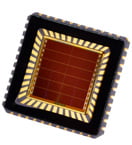A battery with infinite power. Has the Israeli company Sol Chip found the way to do it? The Haifa-based company has developed the world’s first solar battery that is able to recharge itself to power wireless sensors and mobile electronics devices. Operable in sunlight and low-light environments, the batteries are a result of the cross pollination of solar cell and microchip technologies.
“The company offers the missing technology that will improve batteries’ life or in many cases eliminate the need in a battery as a power source in low power applications,” says CEO and founder of Sol Chip, Dr. Shani Keysar.
Related articles
- Israeli Researchers Use Rust To Store Solar Energy
- Israeli Company Creates Solar-Panel Windows To Power Buildings
“The idea is that chips need power, so why not give them the power directly anyway?” Keysar tells NoCamels. Prior to Sol Chip, she had extensive experience as a researcher at the Technion, and later spent 15 years in the semiconductor industry. It was during the latter years that the idea for a solar battery was conceived, from her initial research on how solar energy can be used to combat growing pollution levels from Haifa’s many industrial companies.
The company’s current product is limited to an output of 8.4 volts of power. Though it is considered a relatively low output, it can provide power to a vast array of outdoor devices. As a first step, the company has been working on adapting the solar batteries into sensors that are used widely in fields of agriculture, farming, weather testing, as well as security related applications.
A farmer’s market
One market Sol Chip is hoping to tackle is the milking industry. Monitors are often attached to cows, in order to gather information about the animal and ensure milk quality. However, these sensors currently run on batteries that need to be replaced. Sol Chip says its battery could be a cost-effective and ecological replacement.
Sol Chip is already working with Netafim, an Israeli company that specializes in drip irrigation technology for agriculture, to replace the batteries on their drippers with the solar battery. The primary benefit of using Sol Chip’s solar batteries is obvious: maintenance cost savings to customers in the long run as it eliminates the expensive costs incurred to replace batteries. If a farmer needs to replace a battery on an outdoor sensor at present, he has to send the unit to the factory or hire the services of a technician to the field to replace it. Both methods are expensive.
Although solar cells have been around for a long time, and microchips have been the mainstay of electronic devices, Sol Chip claims that there has been no known company in the semiconductor industry that has successfully integrated solar cells within the standard chip manufacturing process in a cost effective way. Achieving this goal requires deep understanding and experience of semiconductor manufacturing processes, and Keysar had the advantage of being very well versed in those processes.
Sign up for our free weekly newsletter
SubscribeSol Chip unveiled their flagship solar battery in April this year at the International Conference and Exhibition in Berlin, the world’s leading energy harvesting conference.
Small team, long reach
While the company’s manufacturing technique is patented, it is not without its share of competitors. The company’s closest competitors are those that manufacture small solar cells. Although the solar cells serve the identical function of producing electricity from light, Keysar claims that the solar battery’s advantage is that it can provide output in many different voltages, something which existing solar cells cannot do.
The startup is targeted primarily at the North American and European markets. “It is easy for us, because we already have the connections and people in those markets,” says Keysar.
Sol Chip’s main clients will be the hardware integrators that develop and supply sensor systems for agriculture, farming, and defense security. Although the staff headcount is small (currently at six), it has already cast its nets globally. Besides a network of representatives in Europe that help to promote Sol Chip’s presence, the company has also stationed a permanent marketing director in Canada. In the years to come, Keysar intends to expand the reach of the company towards the Far East, as well as India.
With $2.5 million of funds raised so far from the Office of the Chief Scientist, Sol Chip has dedicated most of the money towards R&D. The company is also looking to raise additional funds in an upcoming Series B financing round, to offset R&D and product qualification costs for the next generation of solar batteries it is working on. “The next generation solar batteries will have power management built into the batteries to make energy collection more efficient,” says Keysar.
Photo: Sunset sun and field of green fresh grass under blue sky by Bigstock
Related posts

Resilient And Nutritious New Plant-Based Milk Aims To Make A Splash

Chocolate From Cultivated Cocoa Comes Without Environmental Toll

Plastic Fantastic: Startup Takes PVC Back To Its Crude Oil Roots





Facebook comments